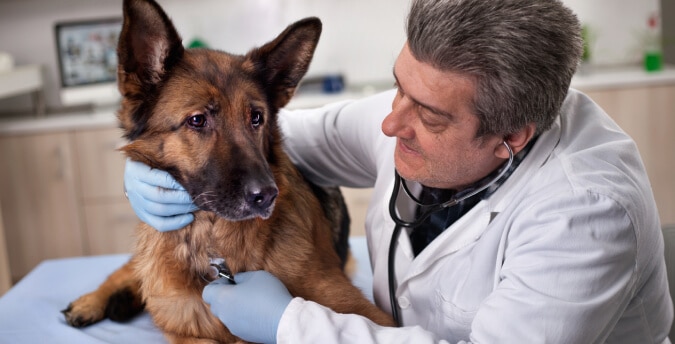Clomicalm for Dogs

Is your dog often nervous? Does it show signs of anxiety that may hinder your pet being able to enjoy its daily routines? Below are some of the most common signs of anxiety to watch out for in your pet dog:
- Some of the most common symptoms are shaking, barking, drooling, and shaking, whining and other destructive behavior. These can be seen in conditions like separation anxiety or it may just be a natural behavior for your pet.
- You dog can also suffer from anxiety associated with certain types of stimulus. For example, if your dog hears loud fireworks, or if there is a thunderstorm occurring, your dog may show symptoms of fear and anxiety related to the situation.
CLOMICALM OR CLOMIPRAMINE
Clomipramine or Clomicalm is a prescription drug that is used to treat symptoms associated with conditions like anxiety, depression, and even obsessive compulsive disorder. It’s an antidepressant that helps increase serotonin levels in the brain so that mood can be balanced. It can also help treat aggression in pets as well.
BEFORE GIVING YOUR DOG CLOMICALM
If your dog shows symptoms of anxiety, then you may be thinking about considering or trying out clomicalm for your pet. However, make sure to consult your veterinarian about it first. The medication is available in various doses, which will depend on your dog’s current condition. Consulting a veterinarian will help you know or determine the right dose for your pet.
Nonetheless, make sure to start with a small dose first, and start to increase from there. The reaction of your pet to the medication will make a huge difference on the amount of dosage that you will be giving. This way, you will also be lowering the bad side effects that may come with the medicine as well.
THINGS TO KEEP IN MIND
If you are planning on giving your dog clomicalm, it is important to make sure that your dog hasn’t taken the following medications for the past two weeks:
- Monoamine oxidase
- Dogs that used a preventic tick collar
COMMON SIDE EFFECTS OF CLOMICALM
Just like any other medication, clomicalm will also have certain side effects on your pet dog. When you give your pet dog clomicalm, it is important to observe your dog if it is suffering from any issues that may lead to emergencies. It is also important to take note of allergic reactions in your pet from taking the medication as well. Some symptoms may include swollen lips. As a pet owner or parent, it is important to make sure that your pet is healthy, and thus, being aware of the possible side effects of clomicalm. Below are some of the most common ones:
- Lethargy and drowsiness
- Constipation
- Dry mouth and eyes
- Nausea, panting, or headaches
- Loss of weight and appetite
If your dog also shows signs of the following, then you should take it to the veterinarian immediately:
- Trouble breathing and irregular heartbeat
- Hives and seizures
- Fever, muscle weakness and swelling of lips, tongue or face
Lastly, never give your pet clomicalm if your dog has the following medical conditions as well:
- Liver or kidney disease
- Asthma and/or diabetes
- Thyroid disease
- Digestive or intestinal problems
- Pregnant
- Has a heart condition
- High blood pressure
